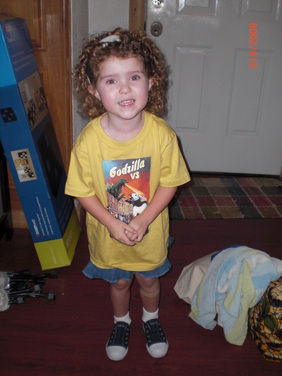
I remember the first time I noticed this. We were playing in a public park. Reese would call all the strange kids she had just met on the jungle-gym “friends.” She would run after a little boy, and I’d ask her what she was doing. “I run with my friend,” she’d say as if it were obvious, which I suppose to her it was.
And it’s not just kids. I’ve noticed her doing the same thing in reference to adults, especially those at church and at school.
I was pleased and saddened at the same time by her use of the word “friend.”
How wonderful it is that she looked to all the new people in her life with that kind of glow in her spirit. One of the greatest injustices, at least to my mind, is when a child is coached by early tragedy to eye any newcomer as a likely enemy and not as a likely friend.
But at the same time I had the dark premonition of an almost inevitable future conversation with a tearful Reese. In this talk I will have to try to explain to her that not everyone she meets wants to be her friend. Sometimes it seems people spend almost all their effort and energy on being the exact opposite of friends.
Sometimes we tend to spend our energy on what they call in politics “smear campaigns.” Sadly, from early on Christians have done their share of smearing other people who could have easily been friends. Yet, early Christians themselves also received a big helping of smears.
One of the best (or worst, depending on your perspective, I suppose) had to do with Christians being labeled “cannibals” because in worship services they ate the “flesh and blood of Jesus.”
As you may or may not know, Christian worship services often include a ritual, symbolic meal called The Lord’s Supper (aka The Table, Communion, or The Eucharist). At this time in the service someone will usually say something to the effect that Jesus called this bread his body and this cup of wine (or grape juice) his blood. Throw the statement into the negative spin machine and you get…nasty Jesus-eating cannibals!
If my memory serves me (which often it doesn’t), another controversy for the early communities of Jesus’ followers had to do with what is sometimes called “the holy kiss.” But this one wasn’t based on a smear. The early Christians deserved it.
In the close of a letter meant to be read in the worship services of the church in Rome, the apostle Paul wrote, “Greet one another with a holy kiss.”
To do this could easily be seen as scandalous because kisses were only for the right people – the people of one’s clan, or perhaps for the best of friends. But here is Paul asking for people in the community of faith to treat each other as intimates and as equals.
And these Jesus-follower communities were becoming meeting places of people who should not be associating equally as friends as far as the general culture was concerned – the rich and poor, the Jew and non-Jew, the male and female, the master and the slave.
Perhaps stronger still, these communities within them contained people at odds with one other because some conflict that had happened between them – a marriage was going sour, a law suit loomed on the horizon, money had been misused, cruel words had been spit back and forth.
Yet Paul tells the folks gathered as church to kiss each other as friends and family in Christ, to share a holy kiss despite their divisions. People who should not be at peace in such a way, people who were not friends through the arrangements of the world, were to treat each other as friends – even as brothers and sisters – because of the Christ they shared.
Now Paul and these early Christians were not idiots. Their daddies and mommies without a doubt had sat them down at some point and told them that not every stranger is a friend. Further, if you think they are, then you are cruising for an inevitable emotional bruising.
But perhaps those Christians also believed beyond all this that in Christ God was making all things new, including relationships. Maybe because Christ was real, the ultimate way to see another person in God’s real world was as a friend and not as an enemy.
When my inevitable talk with Reese comes, (and bits and pieces of it already have) I will have something to teach Reese. I can teach her about how the broken world often works to break hearts by showing us how many people are not our friends.
Yet Reese may very well have something better to teach me. She can teach me about how the healing love of Christ can work through something as simple as a kiss and the faith to see even strangers as friends.
 RSS Feed
RSS Feed